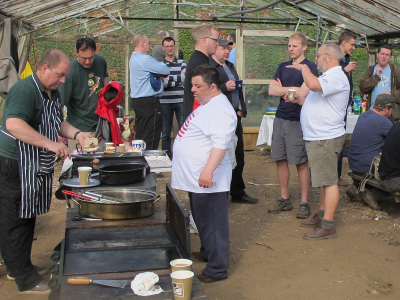 This evening, Donna and I read Haggai together. Earlier we had spent some time chatting, listening and praying with a friend.
This evening, Donna and I read Haggai together. Earlier we had spent some time chatting, listening and praying with a friend.Afterwards we ate a light meal of pasta with bacon and tomato sauce, olives, sweet pepper, mushroom and courgette, then we sat down with our Bibles.
Yahweh's house - The recent chat with our friend was very much in our minds and we talked about hospitality and the place this has always had in our lives. We know it's one of the functions and purposes Father has chosen for us, one of the useful things we can open our home for.
I felt Father calling us to focus on Haggai 1:2-11, but thinking about it and in prayer other aspects of the book also became clear to me.
We quickly agreed that Yahweh's house is the Temple, and like all Old Testament prophecy there is an application for his people today just as there originally was for the Israelites in Haggai's time. So what is the Temple for us today? Why, we are! We are a living temple built of living stones (1 Peter 2:4-5), he resides in us, he is present, not just among his people but in his people.
His house and our houses - Jesus clearly stated, 'I will build my church' (Matthew 16:18). It's not for us to do, but for him to do with us (as living stones). He will place us and cement us in position. But in our lives we can assist him as he works or we can impede him. If we are obedient then we will assist by doing what he commands moment by moment. If we are disobedient we are unlikely to help him at all.
But what are our own 'panelled houses'? They are whatever we are constructing for ourselves. So let's stop building for ourselves and begin building for him. 'Give careful thought to your ways' (Haggai 1:5-6). What are we doing for ourselves (singly or together as his people)?
Some other things that seem clear are that in doing our own thing we will, ultimately, fail. He has 'called a drought' on 'all the labour of your hands' (Haggai 1:11). We cannot hope to prosper in what he has condemned.
Serving Jesus - I also felt sure that our primary purpose and goal must be to serve him and obey him before anything else in our lives. I must do what he tells me even if, like Abraham, it appears to go against everything that seems logical, just, wise or loving (Genesis 22:1-3). He is love. He will hardly call me to do anything that goes against love. But the requirement is for obedience, not for understanding why or how.
We need to know what he is calling us to do, we need to know that whatever that may be it will be part of building his church, and we need to do it without hesitation or regret. We may find we no longer have time to be busy building our own thing.
What if we remain focussed on our own thing? I think, more often than not, he just leaves us to get on with it. But don't be surprised if he 'calls a drought' on the 'labour of your hands'. Striving by our own effort in thorny ground is what Yahweh promised to the first man, Adam (Genesis 3:17-19). Building his house and receiving his glory is what Father promised to the last man, Jesus (John 17:20-24). We are in Christ and he is our High Priest (Hebrews 4:14) and the government is on his shoulders (Isaiah 9:6). In the same way as Zerubbabel he is like the signet ring (Haggai 2:23). He stamps the mark of Yahweh's authority on everything he touches. We are part of the seal of the Father's authority. How awesome is that!
Which will you choose? The work of Adam or the work of Jesus? Choose wisely, both roads are open to you, one is broad with many fellow travellers and the other narrow and hard - but so worth it!
Questions:
- Are you building anything that is more important to you than the church?
- If so, do you think the Lord is blessing it?
- There are many ways of building the church but they all involve living stones. Can you list some of these ways?
- Are there ways you can encourage others to be available to Jesus as apprentice builders?
See also:
- Building the church - Journeys of heart and mind
- Enjoying the life God has given you - In search of the city
- Examples of mutual edification - Assembling of the church
- Haggai - Bible Gateway
- Renewing the temple - Journeys of heart and mind
- Temple in Jerusalem - Wikipedia
- Whose house am I building? - Journeys of heart and mind




















